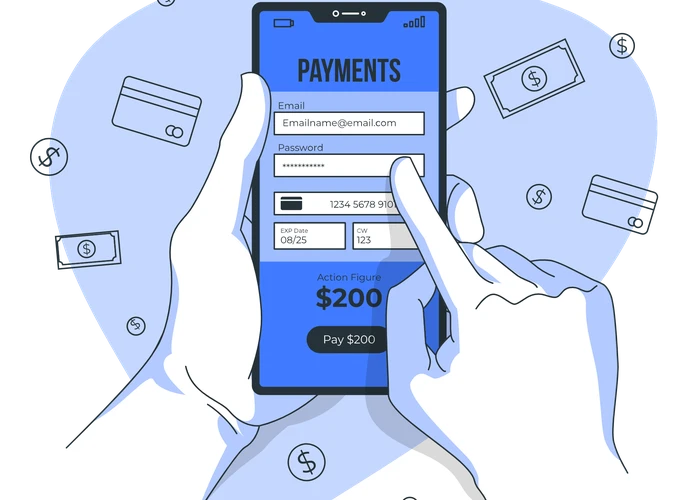How to Choose A Digital Wallet Service Provider -15 Things to Consider
Dec 15, 2021
The security of your funds means everything, so your choice of digital wallet provider must be carefully considered. Learn how to choose a digital wallet provider.
There is a reason why there are suddenly so many digital and mobile wallets. Some are targeted at consumers, while others are designed for business users.
The reason is they are incredibly convenient to use and greatly simplify payments. But how do you choose a digital wallet service provider? What makes a good virtual wallet?
This article explores these questions and, at the time, will suggest a digital wallet that businesses, freelancers, and anyone who works and earns money online must consider.
Let's get started.
What is a digital wallet service provider?
A wallet service provider is a company that provides digital or virtual wallets as a software service. Digital wallets hold, receive, and transfer virtual money or cryptocurrency.
When you think of a virtual wallet, think of it as a real-life wallet that holds physical bank notes, coins, receipts, and debit cards. Only a virtual wallet uses a mobile or web app to hold these things electronically or in virtual form.
Speaking of real-life wallets, you do not buy any random wallet, do you? You purchase something solid that can securely keep your money, ATM cards, ID cards, and other valuables in one place. The same also applies to digital wallets.
Virtual wallets have several advantages over regular, physical wallets. Building your wallet takes time and time to scale up, even after creating it. When you opt for a wallet from a wallet service provider, you get a secure, scalable tool you can easily build on and implement.
There are various e-wallet service providers, so you must take time when selecting one. This article will discuss all you need to know about wallet service providers and how to choose the right one. I will also highlight the advantages and use case scenarios of e-wallets.
What can virtual wallet services be used for?
The functionality and use cases of virtual wallets keep growing. Here are the more common use cases:
1. Payment solution for mobile apps, websites, and software
Consumers can use their virtual wallets to pay for software and to make purchases on mobile apps and e-commerce websites. For that to happen, developers must integrate the virtual wallet into their app, website, or software via an API.
2. Fast, convenient online payment for businesses
Businesses in the telecommunication, banking, transportation, and commerce sectors use virtual wallets to receive money from customers and facilitate transactions. Digital wallets facilitate mobile banking, airtime top-up, micro-lending, insurance, savings, remittances, bill payments, and other use cases.
Transactions facilitated by virtual wallets are fast and secure. In banking, mobile wallets have helped extend services to previously unbanked people through virtual wallets, assisting companies to reach the masses that don't have access to regular financial services.
3. B2B payments
E-wallets can be used to make fast business-to-business payments. You don't have to wait for cheques and make frequent trips to the bank to make deposits. They also allow you to pay suppliers and vendors conveniently.
4. P2P payments
Digital wallets have enabled the peer-to-peer payment revolution that we are experiencing. They allow consumers to transfer funds between their accounts easily. Transfers are usually instantaneous and only require a connected mobile device.
4. Crowdfunding
In the same way they enable P2P payments, virtual wallets make it easy to crowdfund social and developmental projects because of how easily people can send money electronically. Mobile wallets allow people to donate using funding sources of their choice.
For transparency, those administering the crowdfunding program can create a ledger with a single wallet through which contributors can see how much has been collected and how much is still needed to meet the target. Open ledger wallets can also show how the money is being disbursed. Single wallets also allow quick report generation, transparent accounting, and fast reconciliation.
5. E-commerce
E-commerce vendors can add digital wallets, like PayPal, and mobile wallets, like M-Pesa, to their checkout pages and ensure customers can pay with their preferred methods. The prompt notifications merchants get from digital wallets allow them to process orders for shipping early, which boosts customer satisfaction. Virtual wallets also make it process refunds and chargebacks and prevent credit card fraud.
What to consider when selecting a digital wallet service provider?
Taking your time before choosing a digital wallet service provider is crucial. Below we discuss the most important factors to consider when selecting an e-wallet provider.
1. Ease of usage and customization
A good wallet service provider should be easy to use. For developers, it should have plug-in APIs that are easy to integrate and customize for a merchant's unique needs.
2. Scalability
A digital wallet provider that deploys the right system architecture helps companies quickly adapt and scale the mobile wallets to accommodate increased usage and users without requiring technical help. Easy scalability means that there is no need for a customer to hire a large team of developers to manage and make necessary changes.
3. Technical support
A good wallet provider should offer technical support when needed. Some e-wallet service providers charge a monthly fee for technical support and hosting, while others do this for free. Whether it is free or paid, what is important is that the technical support must be reliable.
4. Easy integration
A good digital wallet must be easily integrated with your current tech sta. The wallet service provider should also be readily available to test integrations and train customers to use the wallet.
5. Fast payment and processing of funds
Digital wallets should process funds fast. Fast processing of funds allows for more transactions per second and, ultimately, more revenue. Good virtual wallets should be able to process thousands of transactions per second if necessary.
6. Mobile compatibility
For payment convenience, a digital wallet should have a mobile app. This improves access and allows people to pay on the go. The ease of usage should be the same between the web and mobile versions of the e-wallet.
7. Security
A wallet as a service provider should guarantee the security of your wallets and money. As a standard, their wallets should be PCI-DSS compliant, which is a security standard for companies that accept debit and credit cards.
The best digital wallet providers enable password and pin protection through biometrics. You should also look for features like transaction thresholds and withdrawal and transaction limits per period that help secure your account and prevent misuse.
8. Multiple funding methods
The best wallet providers allow you to fund your wallets in multiple ways, including mobile money, cryptocurrency, bank transfer, debit cards, etc.
9. Multi-currency support
A good e-wallet service provider should offer multi-currency support, allowing users to transact in different currencies. This makes it easy to transact with and pay international customers. Such an e-wallet will enable you to expand your client base without investing in costly physical infrastructure.
With multi-currency support, a single platform can be used to manage everything related to your wallet. There is no need to operate wallets across multiple providers.
A virtual wallet, thus, reduces customer acquisition, transaction, and management costs. It also breaks cross-border payment barriers that commonly hinder businesses from expanding fast.
10. Customer support
A good e-wallet service provider should offer good 24/7 customer support with easy-to-reach customer support staff. The customer representatives should also be knowledgeable enough to attend to your needs and find solutions to the issues customers raise.
11. Minimal charges
It shouldn't cost an arm and a leg to deposit, transfer, withdraw, and use a digital wallet. There is only so much you can pay for convenience.
12. Developers Sandbox testing
A good e-wallet provider should have a sandbox environment for testing the functions and compatibility with apps, software, and websites before going live. This function helps developers ensure the wallet is usable before deployment.
13. Charges tracking and reconciliation
A good e-wallet must allow for charge tracking and various reconciliations. It will enable transaction verification across platforms to ensure accuracy. If records can be easily highlighted, issues can be detected quickly, saving time.
A good digital wallet should also be easy to automate, reconcile, and track charges, saving users time.
14. Customization
Some wallets can be customized to suit your unique needs. This is important as, in all fairness, there is no digital wallet that is everything every user wants. So ease of customization ensures that as many users as possible can use the digital wallet.
15. Intra-wallet transfer
Intra-wallet transfers allow users to send transfer money to each other. This service lets businesses transfer funds within the organization and centralizes payments within one platform.
A good digital wallet provider should make it easy to make intra-wallet transfers. These transfers should be free.
Bonus - Separation of user funds
As a business owner, you need a wallet provider that allows you to have separate funds for each user. This makes it easy to check user balances at a glance.
How much does it cost to use a wallet service provider?
Digital wallet service providers use various pricing models. Some wallet service providers like IntaSend are free to use when receiving and sending money. You only pay for internal transfers.
IntaSend: The best wallet service provider in Kenya
Building a digital wallet from scratch requires significant capital, whether developing it yourself or hiring outside developers. You can cut this expense and deploy faster by building on IntaSend's infrastructure.
IntaSend allows you to tap into our scalable environment and use our time-tested SDKs and APIs to create digital wallets you can use internally or offer to your users and customers.
If you are an unregistered business or freelancer and want a secure way to pay and get paid across borders, an IntaSend account has all the digital wallet features you need.
With IntaSend, you can send no-code payment links to clients and get paid through multiple methods, including Bitcoin and ACH. You can also fund your account in various ways, including M-Pesa.
Sign up with IntaSend and enjoy a better way to manage your funds, pay, and get paid from anywhere.

